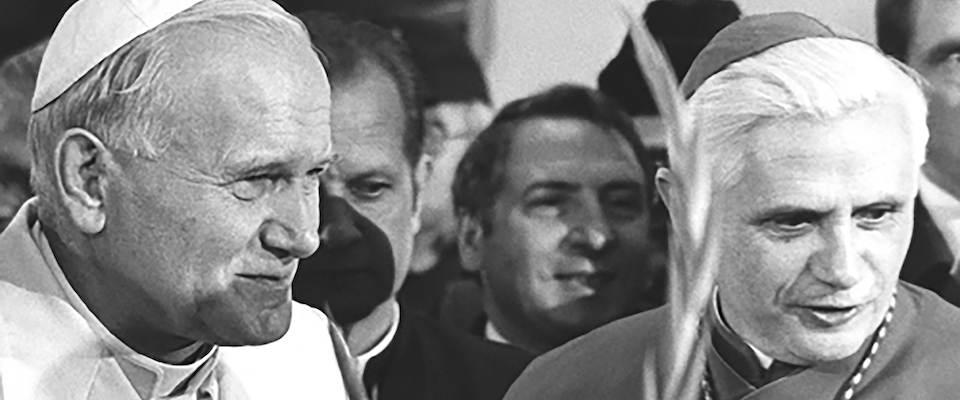
Published August 23, 2023
Pope Francis has just given the Vatican his Ratzinger,” declared one July 2 headline; “Pope Francis Finds His Ratzinger,” announced another, four days later. Both quickie assessments of Argentinian Archbishop Victor Manuel Fernández’s appointment as prefect of the Dicastery for the Doctrine of the Faith were wrong. Archbishop Fernández is no Joseph Ratzinger in either theological heft (a point Fernández himself implicitly acknowledged in one of his post-appointment interviews) or in his relationship to the pope he will serve.
To the latter point: John Paul II did not make Joseph Ratzinger a great figure in the world Church; Ratzinger, one of the most important theologians at Vatican II, was a globally influential churchman long before the Polish pope tapped him as prefect of what was then called the Congregation for the Doctrine of the Faith (CDF). Archbishop Fernández’s career, however, has been almost entirely a creation of Pope Francis. As archbishop of Buenos Aires, Jorge Mario Bergoglio appointed Fernández the president of the Catholic University of Argentina (over the objections of CDF and the Congregation for Catholic Education), and once he came to Rome, “Pope Bergoglio” (as the Italians refer to him) made extensive use of his protégé in various capacities.
Nor are the intellectual relationships here symmetrical. John Paul II and Joseph Ratzinger worked in close harness for a quarter-century. But their ways of thinking were by no means identical and they disagreed (without being disagreeable) at several key moments, as I demonstrated in Witness to Hope. Moreover, the two men had quite different views of late modernity: John Paul II was rather sanguine about the prospects of the post–Cold War world; Ratzinger tended to think of the destruction of the Bavarian Catholic culture of his youth as a preview of coming distractions for the entire West. By contrast, it is hard to detect a centimeter of distance between the thinking of Pope Francis and Archbishop Fernández, not least because the younger man seems to have been a scriptwriter and amanuensis for his patron.
When Joseph Ratzinger became the chief doctrinal adviser to the pope, he was one of the most learned men in the world, deeply versed in biblical studies, philosophy, history, and political theory as well as the various sub-disciplines of theology. Archbishop Fernández is an intelligent man, but no one could possibly claim that he is as competent, across as wide a range of subjects, as Ratzinger was. In fact, in several of his (numerous) post-appointment interviews, the archbishop betrayed a sorry lack of familiarity with the creative moral theology that has been developed in the Church since John Paul II’s 1993 encyclical, Veritatis Splendor (The Splendor of Truth). In one conversation, for example, Fernández opined that, while Veritatis Splendor had been a necessary corrective to certain untoward tendencies in post-conciliar Catholic moral theology, the encyclical had not fostered theological creativity with real pastoral impact.
I beg to differ. Serious Catholic moral theology and moral philosophy in the English-speaking world have been energized over the past thirty years by John Paul’s brilliant theological and pastoral analysis of the moral life. As Archbishop Fernández prepares to take up his new duties in Rome, perhaps he could accelerate his learning curve by familiarizing himself with such creative, post–Veritatis Splendor books as Veritatis Splendor and the Renewal of Moral Theology (edited by Joseph Augustine Di Noia, Avery Dulles, and Romanus Cessario); Morality: The Catholic View (by Servais Pinckaers); Living the Truth in Love: A Biblical Introduction to Moral Theology (by Benedict Ashley); The Abuse of Conscience: A Century of Catholic Moral Theology (by Matthew Levering); Biomedicine and Beatitude: An Introduction to Catholic Bioethics (by Nicanor Pier Giorgio Austriaco); Aquinas and the Market: Toward a Humane Economy (by Mary Hirschfeld); Good and Evil Actions: A Journey through Saint Thomas Aquinas (by Steven Jensen); Action and Conduct: Thomas Aquinas and the Theory of Action (by Stephen Brock); Cooperation With Evil: Thomistic Tools of Analysis (by Kevin Flannery); Sharing in Christ’s Virtues (by Livio Melina); and The Christian Moral Life (by John Rziha).
Veritatis Splendor enraged Catholic Lite moral theologians in 1993 by its vigorous defense of the classic Catholic understanding that some acts are “intrinsically evil”—wrong in any circumstance—and the encyclical has been a bone in the throat of the establishment Catholic theological guild ever since. It would be beyond tragic if the new prefect of the Doctrine of the Faith used that office to promote the guild’s false claim that Veritatis Splendor was an exercise in papal nay-saying that underwrites theological torpidity and pastoral rigidity.
George Weigel’s column “The Catholic Difference” is syndicated by the Denver Catholic, the official publication of the Archdiocese of Denver.
George Weigel is Distinguished Senior Fellow of Washington, D.C.’s Ethics and Public Policy Center, where he holds the William E. Simon Chair in Catholic Studies.
George Weigel, Distinguished Senior Fellow of the Ethics and Public Policy Center, is a Catholic theologian and one of America’s leading public intellectuals. He holds EPPC’s William E. Simon Chair in Catholic Studies.










